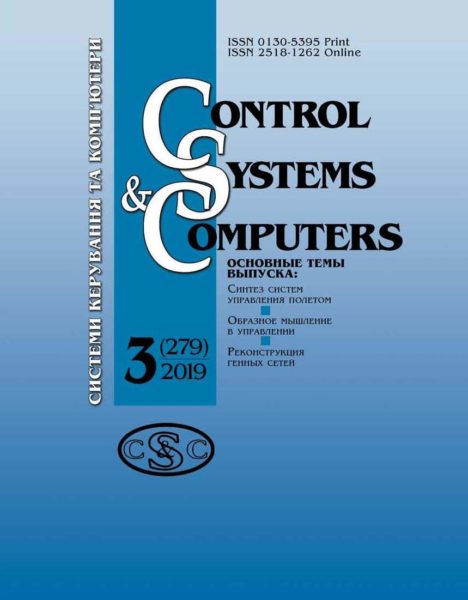Control Systems and Computers, N5-6, 2021, Article 4
https://doi.org/10.15407/csc.2021.05-06.035
Control Systems and Computers, 2021, Issue 5-6 (295-296), pp. 35-44.
UDC 519.816
Babak Oleg V., PhD in Techn. Sciences, Senior Researcher, International Research and Training Centre of Information Technologies and Systems of the NAS and MES of Ukraine, Glushkov av., 40, Kiev, Ukraine, 03187, E-mail: dep115@irtc.org.ua, babak@irtc.org.ua,
Tatarinov Alexey E., Researcher, International Research and Training Centre of Information Technologies and Systems of the NAS and MES of Ukraine, Glushkov av., 40, Kiev, Ukraine, 03187, E-mail: dep115@irtc.org.ua, al.ed.tatarinov@gmail.com
COGNITIVE MODELLING OF THE STATE OF AN OBJECT BASED ON A THOUGHT EXPERIMENT
Introduction. At the current level of development of research in the field of artificial intelligence, it is defined as a set of technological solutions that allow simulating cognitive functions, obtaining results comparable to the results of human intellectual activity. In this regard, the problem arises of creating a technology that imitates the cognitive functions of analyzing the state of objects when the conditions of their functioning change. Analysis of the status of objects in the different problems of environmental, technical, social, political and other nature is carried out most often on information models. The peculiarity of their solution lies in the fact that it is necessary, as a rule, to restore indefinite, sometimes not amenable to quantitative analysis, dependencies and patterns. Since full-scale experiments in these subject areas are often impossible, and sometimes very expensive and even dangerous, the only research method in this case is a thought experiment using the method of experimental perturbations of the state of an object.
Purpose. The purpose of the article is to create a method of cognitive modelling based on a thought experiment for the problem of assessing the state of an object from incomplete and fuzzy data.
Methods. To implement the method of cognitive modelling based on a thought experiment, the method of a mental complete factor experiment (MСFE) is applied using the method of experimental perturbations.
Results. To implement the method of cognitive modelling based on a mental experiment, a procedure has been created that evaluates the state (behaviour) of an object in a present or anticipated future situation based on the method of a mental complete factor experiment (MСFE) using the method of experimental perturbations. The developed procedure makes it possible to obtain solutions to the problem of predicting the state of a certain object in the future using incomplete and fuzzy data and using an expert “built in” to evaluate the forecasting results.
Conclusion. The results of the research presented in this article, which are conceptual in nature, show the possibility of creating elements of technology that imitate the cognitive functions of analyzing the state of objects when changing the conditions of their functioning using a thought experiment. The developed method can be used to solve the problems of assessing the state of various objects when creating intelligent information analysis systems in order to obtain new knowledge about the object.
Download full text! (In Ukrainian)
Keywords: cognitive modelling thought full factorial experiment, experimental perturbation method, linear model, least square method, expert assessment.
- Kalyayev I.A., Zaborovskiy V.S., 2019. “Iskusstvennyy intellekt: ot metafory k tekhnicheskim resheniyam” [“Artificial intelligence: from metaphor to technical solutions”], Control Engineering, Electronics Publishing LLC, SPb, Russia, 5 (83), pp. 26–31. [online] Available at: <https://controleng.ru/wp-content/uploads/CE_0583.pdf> (Last accessed: 17.03.2021). (In Russian).
- Garfinkel , 2007. Issledovaniya po etnometodologii [Studies in ethnomethodology]. Piter, SPb., 335 p. (in Russian).
- Gorelova G.V., Melnik E.V., Korovin Ya.S., 2010. “Kognitivnyy analiz, sintez, prognozirovaniye razvitiya bolshikh sistem v intellektualnykh RIUS” [“Cognitive analysis, synthesis, forecasting of development of large systems in intelligent RIUS”], Arts. intelligence, 3, pp. 61–72. [online] Available at: <http://dspace.nbuv.gov.ua/bitstream/handle/123456789/56170/07-Gorelova.pdf?sequence=1> (Last accessed: 17.03.2021). (In Russian).
- Babak O.V., Surovtsev I.V., Tatarinov A.E., Galimova V.M., 2019. “The Method of Psychophysical Scale Constructing for Assessing the Conditions of the Studied Object”, Control Systems and Computers, IRTC, Kyiv, 5, pp. 70-78. (In Ukrainian).
https://doi.org/10.15407/csc.2019.05.070 - Abramova N. A., “Chelovecheskiye faktory v kognitivnom podkhode” [“Human factors in the cognitive approach”], Large-Scale Systems Control, Vypusk 16, IPU RAN, Moscow, pp. 5–25. (In Russian).
- Gorelova G.V., Melnik E.V., Radchenko S.A., Kalyayev A.I., 2007. “Planirovaniye eksperimenta pri issledovanii novykh metodov i algoritmov organizatsii raspredelennykh vychisleniy” [“Planning an experiment in the study of new methods and algorithms for organizing distributed computing”], Vestnik kompyuternykh i informatsionnykh tekhnologiy, 10, pp. 49–56. (In Russian).
- Albertin S. V., 2016. “Kognitivnoye modelirovaniye kak sposob nauchnogo poznaniya i tvorchestva” [“Cognitive modeling as a way for scientific creativity”], Electronic scientific & practical journal «Humanitarian scientific research», 8, pp. 20–228. [online] Available at: <http://human.snauka.ru/2016/08/16289> (Accessed03.2021). (In Russian).
- Harrington E.C. The Desirability Function. Industrial Quality Control, 1965, 21 (10), pp. 494–498.
- Tikhonov A.N., Arsenin V.O., 1986. Metody resheniya nekorrektnykh zadach [Methods for solving ill-posed problems], Science, Moscow, 287 p. (In Russian).
- Adler Yu.V., Markova Ye.V., Granovskiy Yu.V., 1976. Planirovaniye eksperimenta pri poiske optimalnykh usloviy [Planning an experiment when searching for optimal conditions], Monograph, Nauka, Moscow, 280 p. [online] Available at: <https://techliter.ru/load/0-0-1-2759-20> (Accessed03.2021). (In Russian).
- Osypenko V.V., Babak O.V., Stepashko V.S., 2016. Prystriy dlya vyboru optymalnykh rishen [Device for the selection of optimal solutions], Ukraine, Patent 111567. (In Ukrainian).
Received 08.07.2021



